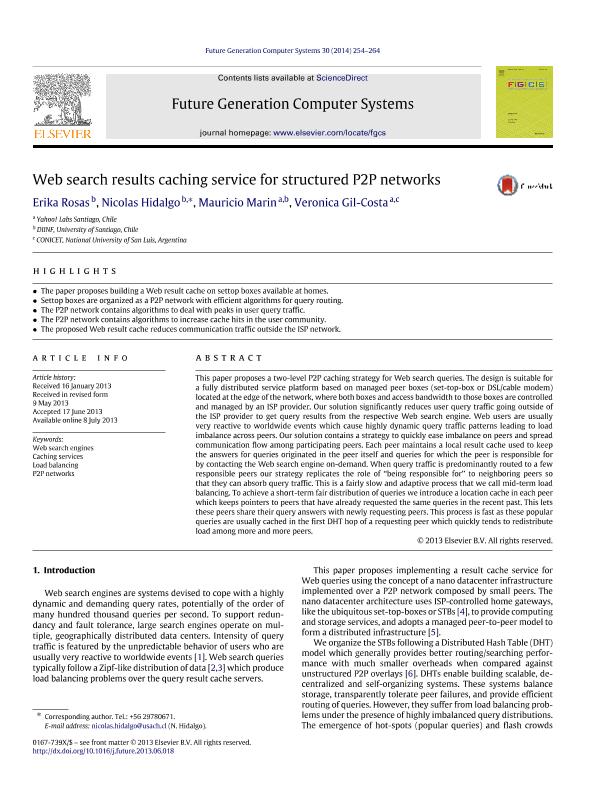Mostrar el registro sencillo del ítem
dc.contributor.author
Rosas, Erika
dc.contributor.author
Hidalgo, Nicolas
dc.contributor.author
Marin, Mauricio
dc.contributor.author
Gil Costa, Graciela Verónica

dc.date.available
2016-08-10T21:46:11Z
dc.date.issued
2014-01
dc.identifier.citation
Rosas, Erika; Hidalgo, Nicolas; Marin, Mauricio; Gil Costa, Graciela Verónica; Web Search Results Caching Service for Structured P2P Networks; Elsevier; Future Generation Computer Systems; 30; 1-2014; 254-264
dc.identifier.issn
0167-739X
dc.identifier.uri
http://hdl.handle.net/11336/7073
dc.description.abstract
This paper proposes a two-level P2P caching strategy for Web search queries. The design is suitable for a fully distributed service platform based on managed peer boxes (set-top-box or DSL/cable modem) located at the edge of the network, where both boxes and access bandwidth to those boxes are controlled and managed by an ISP provider. Our solution significantly reduces user query traffic going outside of the ISP provider to get query results from the respective Web search engine. Web users are usually very reactive to worldwide events which cause highly dynamic query traffic patterns leading to load imbalance across peers. Our solution contains a strategy to quickly ease imbalance on peers and spread communication flow among participating peers. Each peer maintains a local result cache used to keep the answers for queries originated in the peer itself and queries for which the peer is responsible for by contacting the Web search engine on-demand. When query traffic is predominantly routed to a few responsible peers our strategy replicates the role of "being responsible for" to neighboring peers so that they can absorb query traffic. This is a fairly slow and adaptive process that we call mid-term load balancing. To achieve a short-term fair distribution of queries we introduce a location cache in each peer which keeps pointers to peers that have already requested the same queries in the recent past. This lets these peers share their query answers with newly requesting peers. This process is fast as these popular queries are usually cached in the first DHT hop of a requesting peer which quickly tends to redistribute load among more and more peers.
dc.format
application/pdf
dc.language.iso
eng
dc.publisher
Elsevier

dc.rights
info:eu-repo/semantics/openAccess
dc.rights.uri
https://creativecommons.org/licenses/by-nc-nd/2.5/ar/
dc.subject
P2p
dc.subject
Simulacion
dc.subject.classification
Ingeniería de Sistemas y Comunicaciones

dc.subject.classification
Ingeniería Eléctrica, Ingeniería Electrónica e Ingeniería de la Información

dc.subject.classification
INGENIERÍAS Y TECNOLOGÍAS

dc.title
Web Search Results Caching Service for Structured P2P Networks
dc.type
info:eu-repo/semantics/article
dc.type
info:ar-repo/semantics/artículo
dc.type
info:eu-repo/semantics/publishedVersion
dc.date.updated
2016-08-04T17:24:04Z
dc.journal.volume
30
dc.journal.pagination
254-264
dc.journal.pais
Países Bajos

dc.journal.ciudad
Amsterdam
dc.description.fil
Fil: Rosas, Erika. Universidad de Santiago de Chile; Chile
dc.description.fil
Fil: Hidalgo, Nicolas. Universidad de Santiago de Chile; Chile
dc.description.fil
Fil: Marin, Mauricio. Universidad de Santiago de Chile; Chile. Yahoo; México
dc.description.fil
Fil: Gil Costa, Graciela Verónica. Universidad Nacional de San Luis; Argentina. Consejo Nacional de Investigaciones Científicas y Técnicas. Centro Científico Tecnológico San Luis; Argentina
dc.journal.title
Future Generation Computer Systems

dc.relation.alternativeid
info:eu-repo/semantics/altIdentifier/url/http://www.sciencedirect.com/science/article/pii/S0167739X13001325
dc.relation.alternativeid
info:eu-repo/semantics/altIdentifier/doi/10.1016/j.future.2013.06.018
dc.relation.alternativeid
info:eu-repo/semantics/altIdentifier/doi/http://dx.doi.org/10.1016/j.future.2013.06.018
Archivos asociados
